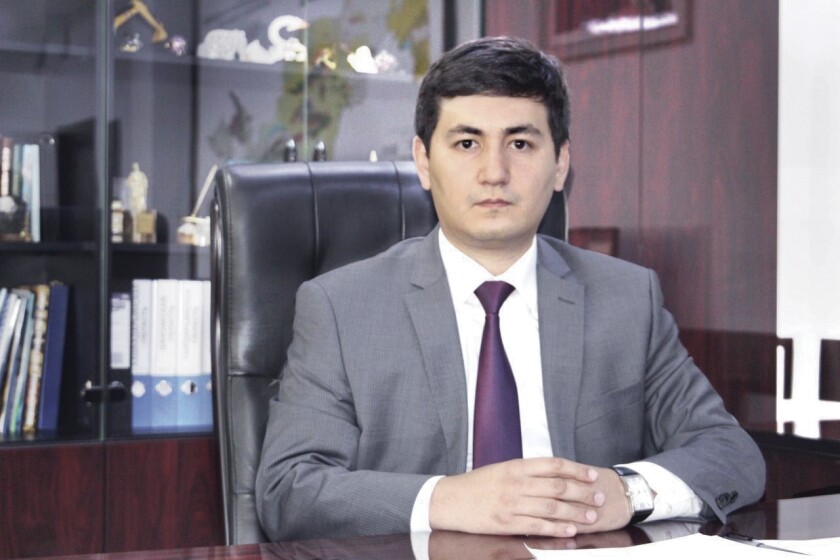GlobalMarkets: What are the priorities for reforming Uzbekistan’s metals and mining sector?
Bobir Islamov, Chairman of the State Committee for Geology and Natural Resources, Uzbekistan: The industry faces a number of important challenges. Firstly, developing the mineral resource base through efficient exploration, improving outdated equipment and launching a modernisation programme. As part of the modernisation effort,
total purchases of new equipment in the current year will reach $40m. This includes equipment that will increase drilling productivity by 25% and raise the volume of core recovered to 97%. We have also purchased equipment for conducting aerial geophysical exploration, which allows us to identify promising areas in a shorter time.
At the same time, there is a focus on personnel training. Goskomgeology and the Uzbek University of Geological Sciences have established a new teaching cluster around a single campus university, which will function as a place where students can study and conduct laboratory research at the same time.
Another priority is to increase investment attractiveness through better legislation. There has been huge work already in this area. We have contacted several foreign consultancies to help us develop the strategy, which includes reducing the tax burden on companies and making information more available and transparent.
GlobalMarkets: How has Goskomgeology’s structure and remit changed?
Islamov: There are 22 entities that used to be under Goskomgeology, most of which are focussed on research and exploration. With help from international auditors we estimated the value of all these companies’ assets and transformed them into joint stock companies. Most have since been combined into one huge geological exploration company — Uzbekgeologorazvedka — with a modern corporate management system, which is designed to operate in market conditions.
The company combines all the former regional geological exploration companies and will cover lab facilities and geophysical facilities. Goskomgeology now focuses mainly on regulation, including policy for exploration and the protection of subsoils. At the same time, we are gathering and consolidating all geological information and taking responsibility for relations with subsoil users.
GlobalMarkets: How will Goskomgeology interact with the new exploration entity?
Islamov: So together with the Ministry of Finance we work on an annual geology exploration programme based on an allocated state budget. Goskomgeology contracts the agreed list of exploration projects out to Uzbekgeologorazvedka. Representatives from Goskomgeology, the State Asset Management Company and the Ministry of Finance are on the supervisory board of Uzbekgeologorazvedka, which will remain a state-owned entity, but the strategy is to gradually reduce the share of state ownership.
GlobalMarkets: What kind of new regulation is Goskomgeology working on?
Islamov: The most important document under development is the new law “On Subsoil”. This document has already been prepared and passed through the Ministry of Justice and is now with the government. The law is under discussion and will soon be debated in parliament. We began by studying international best practice and experience. In the drafting process we consulted several organisations including Boston Consulting, the EBRD and the World Bank.
The measures the law would introduce includes definitions of competence for personnel, so introducing qualification standards for key jobs. At the same time, it aims to rationalise the use of subsoils by introducing a block system for mining permits. This type of system is already effective and in use in Canada, Australia and Kazakhstan. There are also minimum requirements for the exploration of mining. There are articles for providing free access to geological information, the digitisation of data, conservation and sustainable use of subsoil. The royalties of many liquid metals and minerals are also being lowered in order to increase the sector’s appeal to foreign investors.
GlobalMarkets: Can you outline how the block system will work?
Islamov: We enlisted the help of the EBRD as a consultant on the block system. Greenfield areas, or less studied areas, will be allocated using the block system on the principle of first come, first served. Brownfield sites with proven deposits will be allocated through an online transparent auction, which are open to domestic and international companies.
The first auctions took place earlier this year, when we auctioned 40 sites. The winners included firms from Turkey, Russia, China and Uzbekistan. By the end of this year, we plan to put forward another 20 sites. This will likely happen in the autumn. Most of these will be brownfield sites with proven deposits.
We are planning roadshows to help make investors aware of the auctions in order to attract interest from companies from other countries. During 2020 this was hard to do because of the pandemic. We’re already working on the schedule, which will include Canada, the UK and briefings in Korea and Japan.

